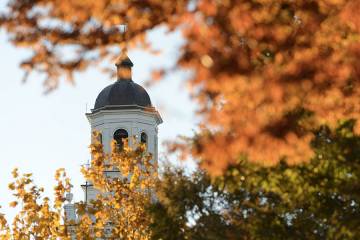Johns Hopkins University graduate programs in education, engineering, public affairs, medicine, and nursing are among the country's very best, according to the annual U.S. News & World Report rankings of the nation's Best Graduate Schools released today.
Other disciplines, such as public health—which has held the No. 1 spot for 26 consecutive years—and the sciences, humanities, and social sciences, were not newly ranked this year. U.S. News will continue to use rankings from earlier years in those fields until they are ranked again.
The overall U.S. News Best Graduate Schools rankings are based on a number of indicators—including an institution's global and national reputation, publications and citations, research statistics, admitted student information, and other factors. Many rankings, including the specialty categories and this year's public affairs rankings, are determined by peer review.
Nursing
The School of Nursing master's degree programs remained No. 1 in the nation in metrics-based rankings. "We are truly proud of this ranking and the spotlight it puts on the hard work that is the backbone to our success in education, research, and practice," says Patricia Davidson, dean of the School of Nursing. "Our continued No. 1 ranking shows stability in the quality and excellence of our programs, mission, and opportunity for students."
In specialty areas, the school was ranked by peers:
- No. 1 in DNP Nurse Practitioner Adult Gerontology Primary Care
- No. 2 in DNP Nurse Practitioner Administration; Family; Leadership (tied with Rush University)
- No. 2 in Master's Administration
- No. 4 in DNP Adult Gerontology Acute Care
- No. 4 in Master's Nurse Practitioner Adult Gerontology Acute Care
- No. 5 in Master's Nurse Practitioner Adult Gerontology Primary Care (tied with Columbia University)
- No. 6 in Master's Nurse Practitioner Mental Health (tied with University of California San Francisco)
Medicine
The School of Medicine remained No. 2 in the nation for research in metrics-based rankings. In specialty areas, the school was ranked by peers:
- No. 1 in internal medicine
- No. 1 in anesthesiology
- No. 1 in radiology
- No. 1 in surgery
- No. 2 in obstetrics and gynecology (tied with Harvard)
- No. 3 in pediatrics
- No. 3 in psychiatry
- No. 20 in primary care
"For more than a century, the Johns Hopkins School of Medicine has been a leader in medical research and the training of generations of physicians," says Paul B. Rothman, dean of the medical faculty and CEO of Johns Hopkins Medicine. "We are so proud of this recognition, and of the hard work and dedication of our faculty, staff, and students."
Engineering
The Whiting School of Engineering remained No. 17 this year in metrics-based rankings, a position it tied for last year. In subcategories, the school was ranked by peers:
- No. 1 in biomedical engineering
- No. 14 in mechanical engineering
- No. 19 in materials engineering
- No. 20 in chemical engineering
- No. 27 in electrical engineering
- No. 27 in environmental engineering
- No. 28 in computer engineering
- No. 33 in civil engineering
"We are gratified that we continue to be counted among the nation's best engineering programs," says Ed Schlesinger, dean of the Whiting School.
Education
The School of Education ranked No. 15, down from No. 7 last year, and was ranked 24th in education policy. "We are pleased that U.S. News continues to rank the School of Education among the best schools of education, and that our peers and school administrators agree," says Christopher Morphew, dean of the School of Education.
Public Affairs
In a peer review, the university's public affairs programs were collectively ranked No. 38. The university was ranked by peers in the following specialty areas:
- Health policy and management (No. 4)
- International/global policy (No. 6)
Posted in University News
Tagged university rankings









